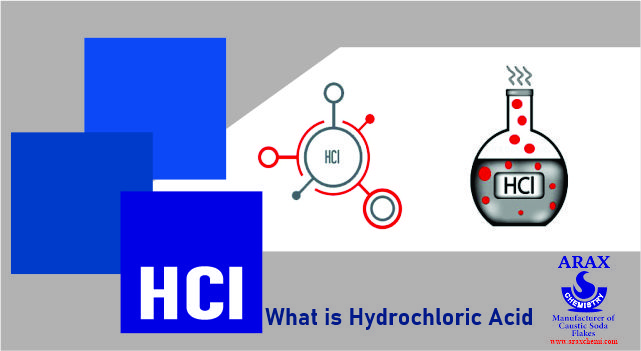What is Hydrochloric Acid?
Hydrochloric acid is formed when Hydrogen Chloride gas is mixed in water. When the reaction takes place Hydrochloric acid also known as Muriatic Acid forms giving out a pungent smell and is basically an odorless and colorless solution. Each molecule of Hydrochloric acid is composed of a one-to-one ratio of hydrogen and chlorine. It is a highly corrosive chemical compound and can be toxic as well.
Hydrochloric acid also is known as muriatic acid, is a poisonous, corrosive hazardous liquid that reacts with most metals to form explosive hydrogen gas and causes severe burns and irritation of the eyes and mucous membranes. It is made by absorbing hydrogen chloride in water. Most acid is the byproduct of chlorination. Pure acid is produced by burning chlorine and hydrogen. Hydrogen acid is available in technical, recovered, food processing, and reagent grades. Frequently the commercial grades are slightly yellow as a result of impurities notably dissolved iron. Reagent grade, which normally contains about 37.1% hydrochloric acid, is perfectly clear and colorless.
Hydrochloric Acid Uses
One interesting thing about Hydrochloric acid is that our stomachs make this chemical naturally which further helps in the digestion of food. Hydrochloric acid acidifies the stomach contents. This acid is also found primarily in several industries like rubber, textiles, and even in photography. It is also a common item in homes. Having said that, there are a lot of uses of Hydrochloric acid. Industrially, it is used to process steel, in the production of batteries, fireworks, and more. Let’s have a look at some uses of HCl in detail.
Common Uses of Hydrochloric Acid
_Production of Organic Compounds
_Production of Inorganic Compounds
_Removing metal stains
_Oil production
_Purification of Table Salt, and pH Control
1. Production of Organic Compounds
What is Hydrochloric Acid
Hydrochloric acid is used in the production of organic compounds like vinyl chloride and dichloromethane for plastics or PVC (Polyvinyl Chloride), biphenyl A, and many others.
2. Production of Inorganic Compounds
This acid is used to prepare compounds that are used as water treatment chemicals. Some examples include poly aluminum chloride (PAC), iron(III) chloride, ferric acid, and aluminum carbohydrate which are used in treating the water. It is also used in the regeneration of ion-exchange resins and is specifically used to rinse the cations from the resins.
3. Removing Metal Stains and Cleaning Stone and Tile
Hydrochloric acid is highly corrosive and because of this nature, it is used as a chemical to remove stains or rust, especially from metals like iron, copper, and others. It is often used in a diluted form. Hydrochloric acid is commonly used for cleaning tiles in kitchens and bathrooms and it also disinfects thoroughly. It is also used in the textile industry for bleaching clothes and processing leather in the leather tanning industry.
4. For Purification of Table Salt and pH Control
This acid is used to purify table salts. Further, HCl Acid is used mostly for regulating the acidity (pH) of solutions and it is used in controlling the pH of pharmaceutical products, foods, and water.
For Oil Production
Hydrochloric acid is used in the production of oil production. Generally, HCl acid is injected into a rock where due to the reaction the rock forms large-pore structures. Now, this significantly assists in oil production.
Hydrochloric Acid Uses in Daily Life
Until its many industrial uses were realized, hydrochloric acid was dissolved in liquids and dumped in the sea. Hydrochloric acid is a solution of hydrogen chloride gas in water. Some main industrial uses of hydrochloric acid are Cleaning or pickling of metals
_Production of glucose and corn sugar from starch
_Refining of cane sugar
_ Making glue and gelatin
_Manufacturing synthetic rubber and plastics
_Purification of common salt
HCl Acid Uses
What is Hydrochloric Acid
HCl is the most common acid used. Organic acids acetic acid and formic acids came into use because they are less corrosive than hydrochloric acid. Therefore, their primary benefit is in high-temperature applications.
Formic acid is more strongly reactive than acetic and is closer to HCl in strength albeit still weaker. Therefore, formic acid is not often used alone, although it can be. When it is necessary to replace HCl completely with a weaker acid, acetic acid is the common and most logical choice. Acetic and formic acids are more commonly used in combination with HCl, HCl-acetic, HCl-formic and formic acetic acid blends exist for high-temperature acidizing applications.
ARAX CHEMISTRY is a great manufacturer of Caustic Soda Flakes , Aluminum Sulfate, and Copper Sulfate which offers its High-quality products.
